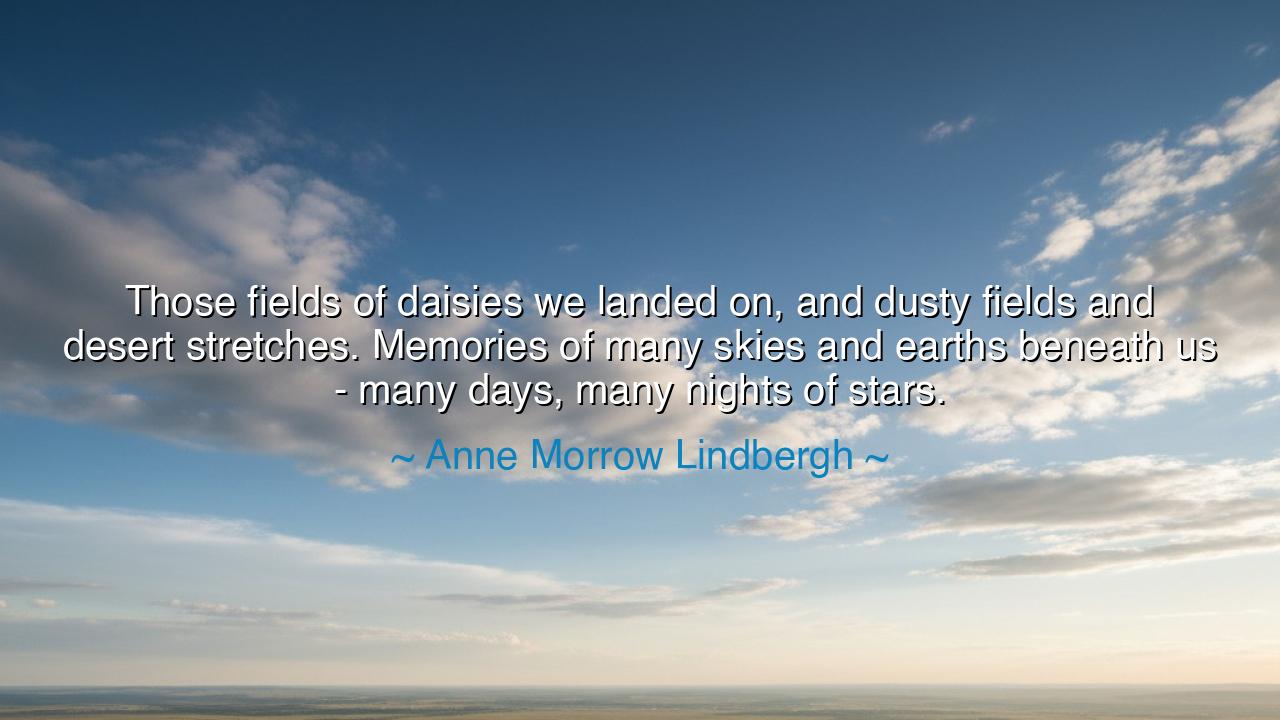
Those fields of daisies we landed on, and dusty fields and desert
Those fields of daisies we landed on, and dusty fields and desert stretches. Memories of many skies and earths beneath us - many days, many nights of stars.






The words of Anne Morrow Lindbergh fall like poetry carried on the wind: “Those fields of daisies we landed on, and dusty fields and desert stretches. Memories of many skies and earths beneath us – many days, many nights of stars.” In this utterance, she does not merely recall the past; she sanctifies it. These are not just landscapes, but holy markers of a journey through life and love, of days filled with adventure and nights crowned with eternity. Her words remind us that memory is not only recollection but a sacred treasure chest, where the heart keeps what the years cannot take away.
For Lindbergh, wife and companion of the famed aviator Charles Lindbergh, fields of daisies, desert stretches, and skies were not abstractions but lived realities. Together they traveled, soared, and landed in places remote and wild, and each landing etched itself into her soul. These words are the voice of one who has lived not only in the safe chambers of the earth but in the vast expanse of the heavens. To remember nights of stars is to say: “I have seen the world from heights most never dare to climb, and the beauty of it is written upon me forever.”
The ancients would have understood her vision. For the wanderers of old—the sailors of the Mediterranean, the nomads of the desert, the explorers who crossed mountains—found meaning in the landscapes that received them. The poet Homer sang of wine-dark seas and fields of Troy; the desert prophets spoke of stars that guided them through endless nights. To them, as to Lindbergh, each place was not merely geography but a testimony: of courage, of survival, of intimacy with the eternal.
Consider Marco Polo, who traveled across deserts, steppes, and seas, gathering in his heart “many skies and earths.” To others, they were only trials, but to him, they became a map of memory, proof that he had lived and ventured. Lindbergh’s words echo this same truth: that our days and nights, our fields and deserts, weave themselves into the tapestry of memory, becoming the very fabric of who we are. In her voice, the intimacy of shared flights with her beloved merges with the grandeur of the world itself.
Yet, her words also speak of fragility. Memories are both eternal and fleeting—eternal in their power to shape us, fleeting in that they can never be relived. The daisies will wither, the dusty fields may vanish, the stars will shift in the heavens, but in the heart, they endure. Lindbergh’s quote is a meditation on time itself: how love, adventure, and wonder are preserved not in the permanence of the world but in the memory of the soul that has witnessed them.
From her reflection comes a lesson for us all: do not walk blindly through life’s landscapes. Whether you travel across continents or only through the fields of your own village, look deeply, breathe fully, and mark the days and nights upon your heart. For one day, you too will sit in the quiet of remembrance, and the question will be—what skies, what earths, what stars live within you?
Therefore, let all who hear these words take action. Seek experiences that fill the soul, not only the purse. Venture into places that awaken awe, whether they be wild deserts or quiet meadows of daisies. Share these journeys with those you love, for companionship multiplies memory. And above all, when night falls, look up at the stars and remember that every sky beneath which you walk is a page in your story, a chapter in the great book of your life.
Thus, Anne Morrow Lindbergh’s words come to us not as nostalgia alone but as prophecy: one day, what will remain of us are not our possessions, but the memories of many skies and earths, the countless days and nights of stars. Choose well what you will carry into eternity.






AAdministratorAdministrator
Welcome, honored guests. Please leave a comment, we will respond soon